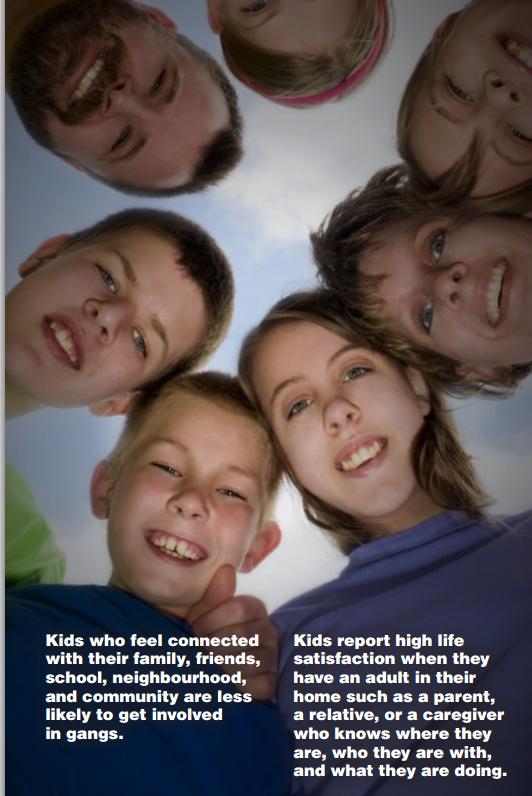Research shows gang members are likely to die before age 30.
Always know where your kids are, what they are doing, and who they are with.
Explain to them that you are asking questions about their activities and whereabouts because you are interested, you love them, and you care about them.
Help your kids choose friends who are not involved in any criminal or antisocial activity.
Build strong family ties by making family events fun such as regular family dinners, outings, watching movies and playing games with them.
Accompany your kids to after school activities such as sports, and stay for the whole duration as often as possible.
Participate in parent-teacher meetings and events at your kids’ schools.
Take interest in your kids’ homework and make sure they complete it.
Encourage your kids to participate in school activities and do volunteer work in the community.
Do the same yourself.
Ensure that they take pride in their cultural/ethnic/religious/linguistic heritage while fully participating in the mainstream life of our society.
Have open communication with your kids so they feel comfortable to share with you their concerns and worries.
Thank them and reward them for sharing information, even when the information might be potentially worrisome.
Remember that kids learn a lot from observation. So modeling good behaviour yourself, such as leading a life that is free of crimes, drugs, and violence is very important.
Foster thankfulness in your kids by modeling thankfulness yourself for your own life situations and people in your life.
Remain consistent in your message to kids that although you love them unconditionally, antisocial behaviour is not acceptable. Ask questions for an honest conversation.
Emphasize the importance of ‘being true to self’ and reward them for doing the ‘right thing’ despite peer pressure.
Demonstrate that forgiving others for their harmful actions towards you is better than trying to take/plot revenge.
Keep an eye on your kids’ choice of movies, videos, and internet browsing habits. If you see a consistent theme of violence and crimes, talk to them and steer them to other entertainment choices.
Make your kids understand that although money is important, long lasting happiness in life comes from having good trusting relationships with family, friends, neighbours, and the community.
If you are worried that your kids may be involved in antisocial and/or self-destructive behavior, remember that it can be changed.
Avoid ‘tough love’ such as cutting them off or forbidding them from going out. Instead, stay involved and let your kids understand that making mistakes and wrong choices are part of learning and that you will always help them correct their mistakes.
When you are worried about your kids’ well-being and need some help, talk to their school teacher, counsellor, or even a police officer. An earlier check and prevention will help your kids stay on track and avoid getting into a dangerous life of crime, violence, and gangs.




